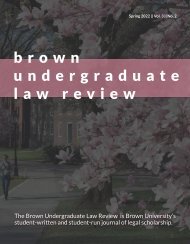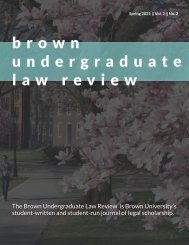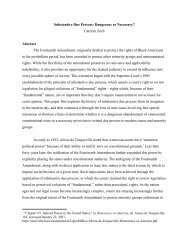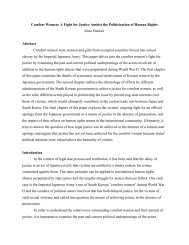Brown Undergraduate Law Review -- Vol. 2, No. 1 (Fall 2020)
We are proud to present the Brown Undergraduate Law Review's Fall 2020 issue. We hope you will all find our authors' works fascinating and thought-provoking.
We are proud to present the Brown Undergraduate Law Review's Fall 2020 issue. We hope you will all find our authors' works fascinating and thought-provoking.
You also want an ePaper? Increase the reach of your titles
YUMPU automatically turns print PDFs into web optimized ePapers that Google loves.
Land Grabs and the Reach of the Law: Reforming Large-Scale Land Acquisition in Sub-Saharan Africa
concessions to local communities made in negotiations. 43
Expanding and Enforcing Contractual Obligations
In order to address these criticisms, a task force of
third-party community organizers needs to be inserted into
the LSLA consultation process. Organizations like African
Smallholder Farmers Group, which specialize in
promoting local community participation in global
markets, or initiatives like the United Nations?Focus on
Agricultural Cooperatives could supply the
intermediaries. 44 These coordinators would work
one-on-one with local communities, allowing them to
better ?assess the use and value of their resources, to
negotiate sources of income through rents or jobs and to
monitor compliance with agreements.? 45 In this way,
contract-related information gaps would be filled by
experienced mediators, while local communities would
provide culture-specific knowledge and articulate their
interests and concerns. Furthermore, given the extended
duration of certain lease periods, organizers would
continue to advise local communities following the initial
consultation process, ensuring due diligence on the part of
investors, and providing legal options in cases of investor
inaction. Given the prevalence of land conflicts and social
instability in response to negligent land expropriation,
some investors may themselves endorse the use of
mediated conversations as a way to avoid investment
delays and violent confrontations with local populations.
Ultimately, while this approach may not level the playing
field between farmers, investors, and state representatives,
it will give local communities a seat at the table.
In order to more effectively level the playing field, SSA
governments must take a stricter and more selective
approach to investment projects. Over the last few years,
African government officials have been eager to sell off
large tracts of land to foreign investors with little
consideration for local populations. 46 In order to combat
the negative impacts of these deals, the African Union
ought to pass and enforce a binding legislative act which
universally defines the basic terms of land deals.
Requirements should include fixed ratios of edible to
nonedible crops, capped water usage, efficient irrigation
schemes, and employment for displaced smallholders at a
set minimum wage. 47
Critics of strict agricultural legislation warn that investors
will simply pivot toward less regulated markets, such as
Asia and Latin America. 48 They claim that such a pivot
would be easy, given the significant crop overlap between
Asian, Latin American, and African agricultural
production. 49 The ensuing capital flight would only
exacerbate present harms, and the decreased revenue
would coincide with increased budgetary demands for law
enforcement needed to enforce the requirements and
monitor compliance.
These arguments are misguided. First, they assume that
arable land is abundant; this premise, however, fails to
reflect current and future economic realities. Analysts warn
that the global agricultural sector, already failing to fully
meet food demand, will be further unable to cope in the
coming years. Thus, uncultivated, arable land will? as it
43. Kerstin Nolte and Lieske Voget-Kleschin, ?Consultation in Large-Scale Land Acquisitions: An Evaluation of Three Cases in Mali,? World
Development, vol. 64 (December 2014), 661.
44. ?Supporting Smallholder Farmers in Africa: A Framework for an Enabling Environment,? African Smallholder Farmers Group (July 2013), 2.
45. Porsani and Lalander, 186.
46. Liz Alden Wily, ?How African Governments Allow Farmers to Be Pushed off Their Land,? The Guardian (March 2, 2012).
47. Johansson, ?Large-Scale Land Acquisitions,? 43.
48. Cecilie Friis and Jonas Østergaard Nielsen. ?Small-Scale Land Acquisitions, Large-Scale Implications: Exploring the Case of Chinese Banana
Investments in Northern Laos,? Land Use Policy, vol. 57 (November 2016).
49. ?The State of Food and Agriculture in Asia and the Pacific region,? Food and Agriculture Organization.
Brown Undergraduate Law Review
26










